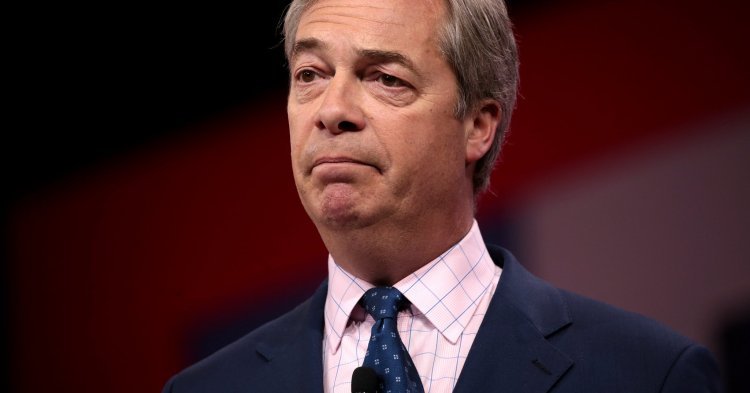Madelaine Pitt: An act of rebellion in the face of the failure of British democracy
Admit it: you gave a small, repressed, internal cheer. We can pontificate about the right to free speech and the benefits of peaceful debate until the cows come home, but please don’t pretend you weren’t a bit smug when you saw Nigel Farage dripping in their dairy. It’s a bit like Take That; you’d skip a track if it came on shuffle at pre-drinks yet then sing along to Patience in the shower. [1]
Most people will agree that, in principle, throwing anything at a politician (be it eggs, tomatoes or overpriced sugar-laden foam) is neither fair nor constructive. But 90% of people I have spoken to about this have reacted not with stuffy horror but a snigger, saying something to the effect of “serves him right”. And that’s because we are not dealing with principles, but in the dire situation in which the UK finds itself today.
I do not advocate violence, including against those who advocate it themselves. The beverage-bowler did indeed violate dear old Nigel’s personal space, a form of assault. Where I disagree with some of the milkshake-thrower’s critics is that he “sunk to the level” of the far right. I’m sorry, but he did not whip up racist hatred or attack minority rights. He threw a MILKSHAKE. I know it’s a slippery slope and we should not endorse physical bullying over reasoned debate. But let’s not blow this out of proportion.
Context is everything. In theory, of course it is not okay to throw a milkshake over a politician. Causing physical intimidation and discomfort to another human being is not okay, even if you disagree with their ideas. As a society, we have evolved enough to create better arenas in which to express our opinions and hold our elected officials to account. Except that none of these are working in Britain in 2019. We are in a desperately diabolical situation of possibly leaving the European Union precisely because all of the usual channels of democratic debate have failed us.
The media is supposed to hold politicians to account and inform the public; instead, Eurosceptic tabloids, often with highly concentrated ownership, spew contorted statistics and mislead readers. Previously a world leader in reliable, objective information, the BBC has become Farage’s living room, giving him disproportional coverage and politely nodding interviewers, thus legitimising his poisonous discourse.
We are supposed to have rules regarding campaign funding to ensure parties debate on a level playing field; it appears Farage has flouted them by allegedly accepting whacking great cheques from co-founder of the Leave Campaign Arron Banks. Millions of people will see their quality of life reduced because of such people.
Yes, in theory, we should fight disinformation with information. But many people do not care about information and would no sooner read a leaflet about the EU than throw a milkshake over themselves. Having spent many a freezing afternoon leafletting with my anti-Brexit campaign group Our Future Our Choice on the streets of York, I promise that trying to reason with Leave voters who are totally disinterested in what tariffs and reduced freedom of movement would do to our economy and society is pretty hard. They have been convinced by Farage and others that quick-fix solutions will solve everything.
Long term, we need education and better mainstream parties. But the clock is ticking. We may well leave the EU without any of Farage’s attacks on our democracy being exposed. In this sense, the milkshaking was not an attempt to silence Farage (as if that were possible), but an alarm bell and an act of rebellion before it is too late. Of course there are better ways of fighting Farage’s poisonous ideas. All of them have so far failed. I wouldn’t milkshake anyone myself, but I understand the extreme frustration of the milkshaker. At least the incident has done something to tarnish the picture-perfect image of a popular, successful, legitimate, mainstream campaign lauded by the media.
Two wrongs don’t make a right. But given the dire circumstances we find ourselves in, given the uncertainty, the xenophobia and the hurt with which Farage has trampled on our lives for his own benefit, and given how unchallenged he remains for the poison he has unleashed, I for one emitted a guilty chuckle when I saw the snaps of him sopping with lactose and caramel. And I’m pretty sure you did too.
Radu Dumitrescu: Throw Eurostat reports, not milkshakes
Is it okay to weaponise milkshakes, sodas, tomatoes, shoes and such projectile-like items and use them against politicians and public figures with whom one disagrees with or whom one finds dangerous to democracy?
The answers differ depending on who does the throwing and who the receiving. Liberals and centrists in Europe may applaud amused when Nigel Farage becomes awash in the calcium-rich dairy, but may just as well condemn the same act if the target is Nicola Sturgeon of the Scottish National Party or up-and-coming figures such as the Polish politician and former LGBT activist Robert Biedroń.
Another approach is thus necessary to judge the act of milkshake-throwing. There are, to my mind, two ways in which to judge any action – through its consequences (consequentialism) and through the intent of those who fulfill it (intentionalism).
The latter is far easier to surmise in this case – the young man who threw the milkshake at Farage wanted to silence him, to show his opposition to the far-right leader’s past policies and positions and to prevent him from impacting the future in a similar way. The young man also wanted to bring attention to Farage’s dangerous xenophobic rhetoric and to convince others to stand up to it. So far so good – if history’s dictators had been met with a wave of milkshakes prior to getting in power, less blood would have been spilled.
But what were the actual consequences? Security tightened around Farage, who was even stuck in his campaign bus due to a group of milkshake-holding youths. Nevertheless, the leader of the Brexit Party remained on top of the polls for the European elections. Moreover, Farage’s supporters, who voted for him because they feel represented by him in one way or another most likely felt humiliated by the event, if not indirectly threatened. In a representative democracy, those we elect stand in for us, they represent our voice – as unreasonable as it may be to others – in the public forum, and attempts to silence a portion of the population is deeply undemocratic.
Silencing the Farages of the world won’t solve our problems. Even worse, condoning acts that have that as a goal would open the gates to a political stage dominated by violence, and it would lead to politics being more like a perpetual screaming match punctuated by the hurling of projectiles to and from one side to another, with compromise and dialogue being the first casualties.
There are numerous effective ways to counter populism, but milkshakes aren’t one of them. Reports and leaflets from Eurostat and Eurobarometer would probably work a lot better due to their informative nature – but also due to their weight.



1. On 28 May 2019 at 10:29, by Ian Beckett Replying to: Debate: Is it okay to throw a milkshake over a politician?
Replying to: Debate: Is it okay to throw a milkshake over a politician?
It is disturbing that Ms Pitt having benefited from tertiary education and extensive travel is not yet sufficiently mature to recognise that throwing anything at someone else is unacceptable. If 90% of the people she has spoken too about this snigger then it is time she broadened her circle and read a little about ‘preference bubbles’.
We have better arenas to debate matters. The range of media outlets in the UK covers the gamut of views on the EU, from the rabid Daily Express to the fawning Guardian, take your pick. Most observers (including four independent reviews) believe that the BBC lean towards the EU so it is hardly reasonable to say that contrary views are not readily available.
The refusal of so many people to accept your view of the EU does not make them wrong or right, it just means they have a different perspective, different priorities and different answers that are just as valid as your own.
When some one talks about ‘attacks on our democracy’ while clearly trying to reverse the democratic decision taken in 2016 before that decision can be implemented one has to wonder about who is attacking democracy. (Especially since the site they write for does not permit contrary views to be published.) I doubt Vince Cable, Caroline Lucas or Jonathan Bartley to name but three, would accept that they are not challenging Nigel Farage.
The views of Mr Dumitrescu are far more considered and equitable.
TO THE EDITOR – please pass this on to Ms Pitt
Follow the comments: |
|
